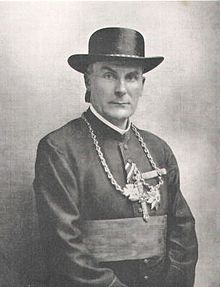Michael von Faulhaber
|
His Eminence Michael von Faulhaber |
|
|---|---|
| Cardinal, Archbishop of Munich and Freising | |
 |
|
| Archdiocese | Munich and Freising |
| Appointed | July 24, 1917 |
| Installed | September 3, 1917 |
| Term ended | June 12, 1952 |
| Predecessor | Franziskus von Bettinger |
| Successor | Joseph Wendel |
| Other posts | Cardinal-Priest of S. Anastasia |
| Orders | |
| Ordination | August 1, 1892 |
| Consecration | February 19, 1911 by Franziskus von Bettinger |
| Created Cardinal | March 7, 1921 by Benedict XV |
| Rank | Cardinal-Priest |
| Personal details | |
| Birth name | Michael Faulhaber |
| Born |
March 5, 1869 Klosterheidenfeld, Unterfranken, Kingdom of Bavaria |
| Died | June 12, 1952 (aged 83) Munich, West Germany |
| Nationality | German |
| Denomination | Roman Catholic |
| Previous post | Bishop of Speyer (1911–1917) |
| Motto | vox temporis vox dei |
| Coat of arms |  |
|
Styles of Michael von Faulhaber |
|
|---|---|
 |
|
| Reference style | His Eminence |
| Spoken style | Your Eminence |
| Informal style | Cardinal |
| See | Munich |
Michael von Faulhaber (March 5, 1869 – June 12, 1952) was a Roman Catholic Cardinal who was Archbishop of Munich for 35 years, from 1917 to his death in 1952. Faulhaber was a political opponent of the Nazi government and considered Nazi ideology incompatible with Christianity; but he also rejected the Weimar Republic as rooted in treason and opposed democratic government in general, favoring a Catholic monarchy. Faulhaber spoke out against some Nazi policies, but publicly recognized the Nazi government as legitimate, required Catholic clergy to remain loyal to the Nazi government, and maintained bridges between fascism and the Church. He ordained Joseph Ratzinger (future Pope Benedict XVI) as a priest in 1951, and was the last surviving Cardinal appointed by Pope Benedict XV.
Michael Faulhaber was born as the third of seven children of the baker Michael Faulhaber (1831–1900) and his wife Margarete (1839–1911). He was educated at gymnasiums in Schweinfurt and Würzburg. In 1887-88 he was a soldier and non-commissioned officer in the Bavarian army. In 1889 he entered the Kilianeum (Catholic) Seminary in Würzburg and was ordained on August 1, 1892. Faulhaber was a priest in Würzburg from 1892 until 1910, serving there for six years. His studies included a specialisation in the early Christian writer Tertullian. In 1895 he graduated from his studies with a doctorate in theology. From 1894 to 1896, he was prefect of the Kilianeum Seminary. From 1896 to 1899, he was engaged in studying manuscripts at the Vatican and other Italian museums. From 1899 to 1903, he was privatdocent in Greek palaeography, Biblical archaeology, homiletics, exegesis of the Psalms, at the University of Würzburg. In 1900 he visited England to study manuscripts of early Christian literature, spending one semester at Oxford. In 1902 he visited Spain for a similar purpose. In 1903 he became professor of theology at the University of Strasbourg.
In 1910, Faulhaber was appointed Bishop of Speyer and invested as such on February 19, 1911. On March 1, 1913 he was appointed a Knight of the Merit Order of the Bavarian Crown by Prince Regent Ludwig; in accordance with the statutes of this order, Faulhaber was ennobled with the style of "Ritter von Faulhaber". In 1916 he won the Iron Cross (as the first clergyman in the German Empire) at the Western Front for his frontline support of troops by acting as a military chaplain. In 1917, his appointment as Archbishop of Munich followed. In 1921 he became a Cardinal, with the title of Cardinal-Priest of Santa Anastasia, and at his death was the last surviving Cardinal appointed by Pope Benedict XV.
...
Wikipedia
